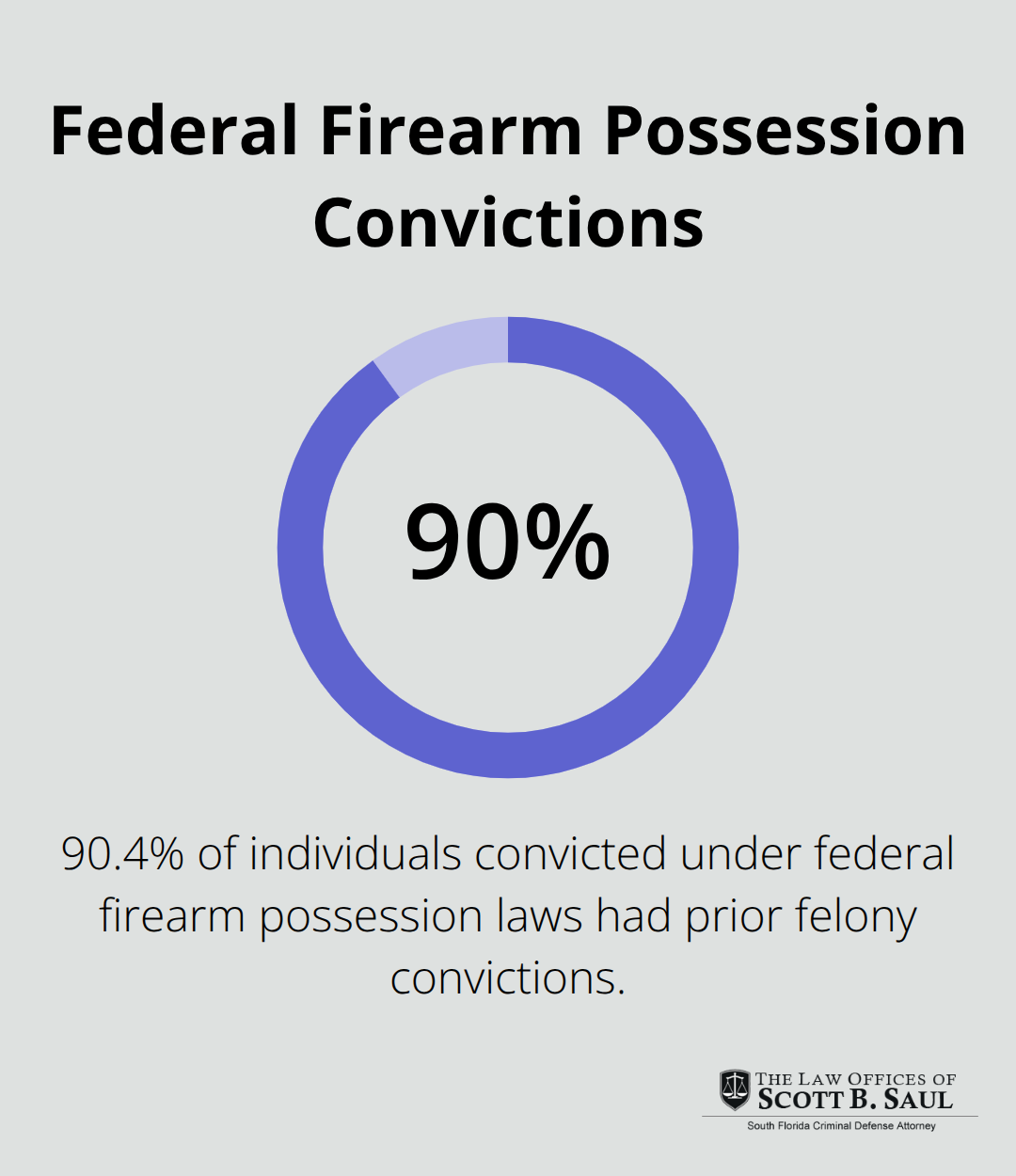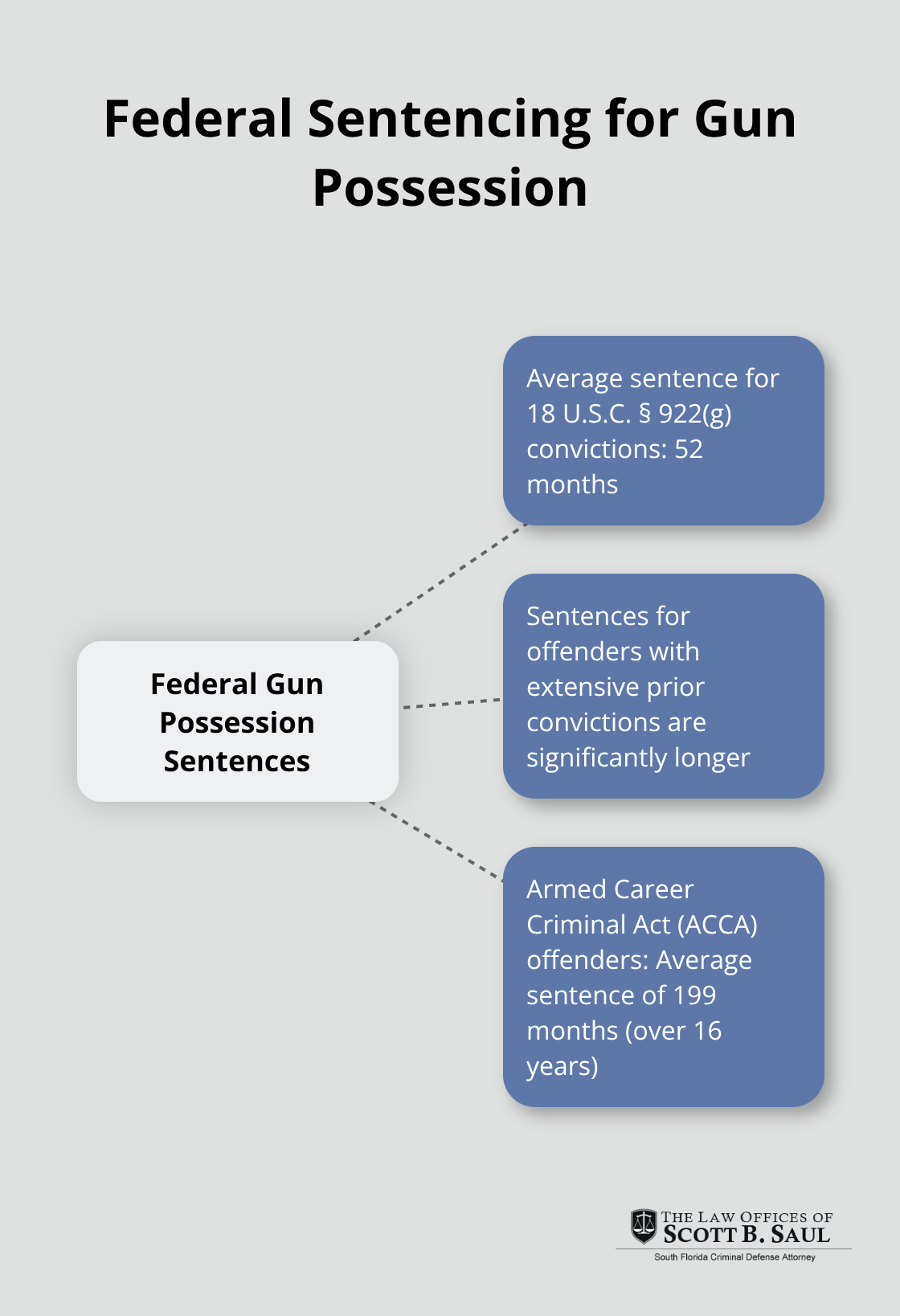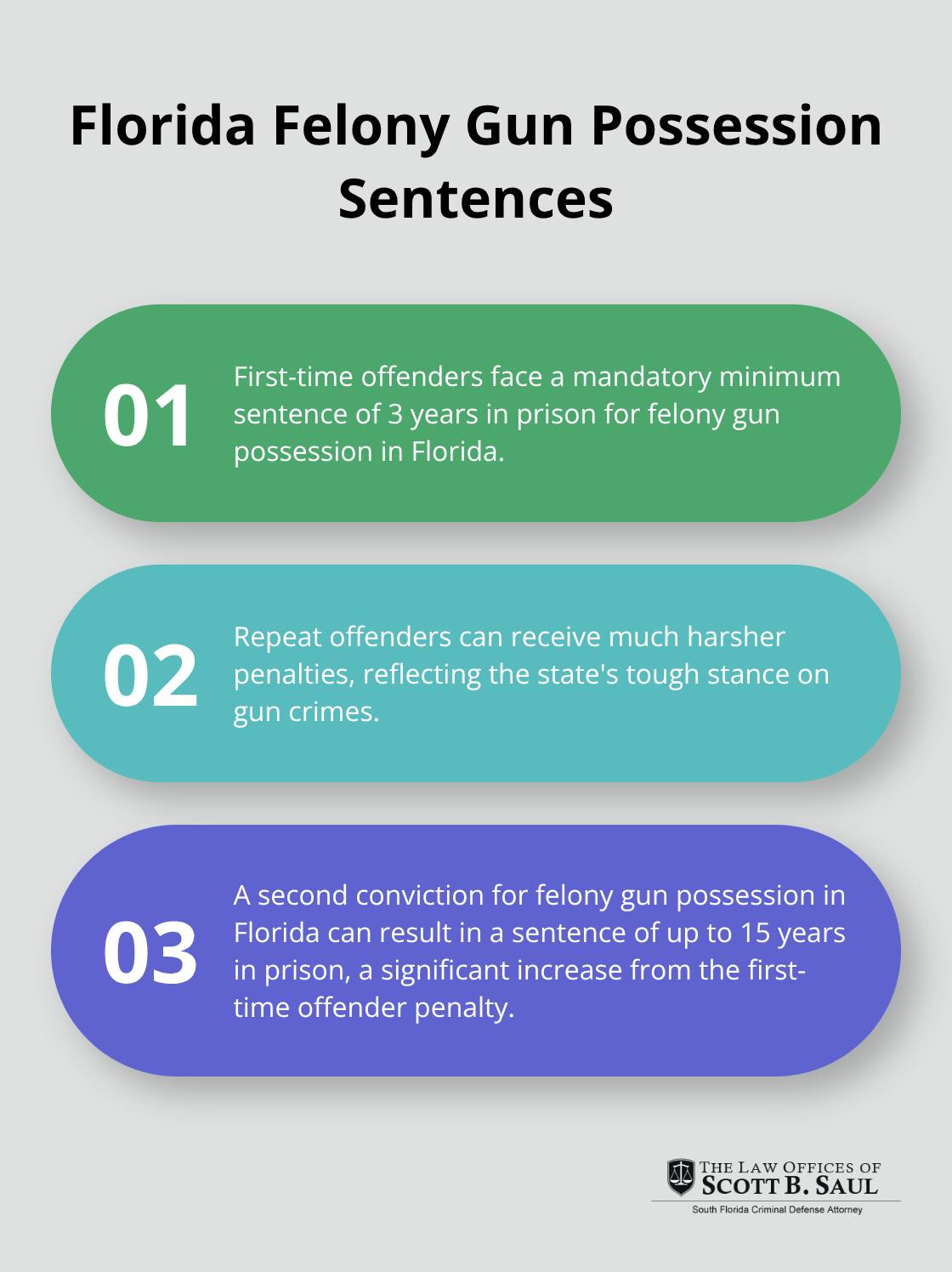How Long Is a Felony Gun Possession Sentence?
By : saulcrim | Category : Criminal Defense | Comments Off on How Long Is a Felony Gun Possession Sentence?
15th Sep 2025

Felony gun possession sentences can vary widely depending on numerous factors. At Law Offices of Scott B. Saul, we often field questions about potential penalties for these serious charges.
Understanding the complexities of federal and state laws is essential when facing such allegations. This post will explore the key elements that influence felony gun possession sentences and provide insights into navigating the legal landscape.
What Constitutes Felony Gun Possession?
Definition and Legal Framework
Felony gun possession involves the unlawful ownership or carrying of a firearm by individuals prohibited from doing so due to their criminal history or other disqualifying factors. This offense carries severe legal consequences and falls under both federal and state jurisdictions.
Federal and State Laws
Federal law, specifically 18 U.S.C. § 922(g), outlines categories of individuals barred from possessing firearms. These include convicted felons, fugitives from justice, unlawful users of controlled substances, and those subject to domestic violence restraining orders.
State laws add another layer of complexity. For example, Florida Statute 790.23 prohibits convicted felons from possessing firearms, with violations resulting in a mandatory minimum sentence of up to 15 years in prison.
Elevating Factors
Several elements can escalate a gun possession charge to a felony:
- Prior Felony Convictions: The United States Sentencing Commission reports that in fiscal year 2024, 90.4% of individuals convicted under federal firearm possession laws had prior felony convictions.

- Firearm Type: Possession of certain weapons (e.g., short-barreled shotguns or machine guns) can automatically trigger felony charges.
- Location: Possessing a firearm in specific areas (such as school zones or government buildings) can increase the severity of the offense.
Intent and Use
The intended use of the firearm plays a critical role in determining charges and potential sentences. Prosecutors who can prove that a defendant intended to use the weapon to commit another crime may seek harsher penalties.
Legal Expertise Matters
Navigating the complexities of felony gun possession cases requires in-depth knowledge of both federal and state laws. Attorneys with experience as former prosecutors (like those at Law Offices of Scott B. Saul) often possess unique insights into case construction and prosecution strategies, enabling them to develop robust defense tactics for clients facing these serious charges.
As we move forward, we’ll examine the specific sentencing guidelines that courts use when determining penalties for felony gun possession offenses.
How Severe Are Felony Gun Possession Sentences?
Federal Sentencing Guidelines
Federal courts use a complex system of guidelines to determine sentences for felony gun possession. The United States Sentencing Commission reports that in fiscal year 2024, the average sentence for individuals convicted under 18 U.S.C. § 922(g) was 52 months. This average, however, doesn’t paint the full picture.
Sentences vary dramatically based on criminal history. Offenders with extensive prior convictions face significantly longer terms. Those who fall under the Armed Career Criminal Act (ACCA) received an average sentence of 199 months – over 16 years behind bars.

It’s noteworthy that 61.2% of sentences for § 922(g) convictions fell below the Guidelines Manual recommendations. This fact underscores the importance of skilled legal representation in potentially reducing sentence length.
Florida’s Tough Stance on Gun Crimes
Florida takes a particularly hard line on felony gun possession. Under state law, convicted felons caught with firearms face a mandatory minimum sentence of three years. This means even first-time offenders under this statute cannot receive less than 36 months in prison.
The penalties escalate quickly for repeat offenders or those with violent criminal histories. In some cases, Florida courts can impose sentences of up to 15 years for a single count of felony gun possession.
Aggravating Factors That Increase Sentences
Several elements can lead to enhanced penalties:
- Type of Firearm: Possession of certain weapons (such as short-barreled shotguns or machine guns) typically results in longer sentences.
- Location: Having a gun in a school zone, government building, or other sensitive areas often triggers additional charges and penalties.
- Concurrent Criminal Activity: If the firearm possession occurred during the commission of another crime, expect significantly harsher sentences.
- Prior Violent Offenses: A history of violent crime dramatically increases the likelihood of lengthy prison terms for gun possession.
The Role of Legal Expertise
Understanding the nuances of both federal and state sentencing guidelines proves essential when facing felony gun charges. The potential for severe penalties makes it imperative to work with attorneys who possess a deep knowledge of firearm laws and a proven track record in navigating these complex cases.
Experienced defense lawyers can identify weaknesses in the prosecution’s case, challenge evidence, and negotiate for reduced charges or sentences. Their expertise often makes a significant difference in the outcome of felony gun possession cases.
As we move forward, we’ll examine the specific factors that influence the length of felony gun possession sentences and how they impact individual cases.
What Impacts Felony Gun Possession Sentences?
Criminal History’s Significant Role
An individual’s prior criminal record heavily influences sentencing outcomes. The United States Sentencing Commission reports on sentencing guidelines for federal courts, which take into account various factors including criminal history categories. This classification often results in substantially longer sentences.
Repeat offenders face particularly harsh consequences. In Florida, a second conviction for felony gun possession can lead to a 15-year prison term, compared to the 3-year mandatory minimum for first-time offenders.

Weapon Type and Circumstances
The specific firearm involved in the offense plays a key role in sentencing. Possession of certain weapons (such as short-barreled shotguns or fully automatic firearms) typically results in enhanced penalties. Under federal law, possession of a machine gun can carry a sentence of up to 10 years, even for first-time offenders.
Location matters significantly. Possessing a firearm in a school zone, government building, or other sensitive areas often triggers additional charges and increased sentences. In some jurisdictions, having a gun within 1,000 feet of a school can double the potential prison term.
Intent and Cooperation
Prosecutors and judges consider the defendant’s intent when determining sentences. Evidence that the firearm was intended for use in another crime typically increases sentences dramatically. Conversely, inadvertent possession or legitimate purposes (such as inherited firearms) may lead to more lenient outcomes.
Cooperation with law enforcement can significantly impact sentencing. Cooperation is at the heart of most complex federal criminal cases, with profound ramifications for who can be brought to justice. This underscores the potential benefits of working with authorities, though such decisions should always involve consultation with experienced legal counsel.
The Importance of Skilled Legal Representation
The complexity of factors influencing felony gun possession sentences makes working with knowledgeable defense attorneys essential. Lawyers with experience in both state and federal courts can navigate the intricate sentencing guidelines, identify potential mitigating factors, and develop strategies to pursue the most favorable outcomes possible.
Final Thoughts
Felony gun possession sentences vary widely, from a few years to decades in prison. Federal cases often result in sentences averaging 52 months, while repeat offenders face much longer terms. In Florida, even first-time offenders must serve a minimum of three years, with penalties escalating rapidly for subsequent convictions.
The severity of these sentences highlights the importance of experienced legal representation. Attorneys can identify weaknesses in the prosecution’s case, challenge evidence, and negotiate for reduced charges or sentences. Their expertise often makes a significant difference in case outcomes.
For those facing felony gun possession charges in South Florida, the Law Offices of Scott B. Saul offers premier criminal defense services. With over 30 years of experience (including as a former prosecutor), Scott B. Saul brings unique insights to developing effective defense strategies. The firm’s strong track record demonstrates their commitment to aggressive representation and protecting clients’ rights.
Archives
- September 2025 (5)
- August 2025 (8)
- July 2025 (8)
- June 2025 (9)
- May 2025 (9)
- April 2025 (8)
- March 2025 (9)
- February 2025 (8)
- January 2025 (9)
- December 2024 (10)
- November 2024 (5)
- July 2024 (2)
- June 2024 (2)
- May 2024 (2)
- April 2024 (2)
- March 2024 (2)
- February 2024 (2)
- January 2024 (2)
- December 2023 (2)
- November 2023 (2)
- October 2023 (2)
- September 2023 (2)
- August 2023 (1)
- July 2023 (2)
- June 2023 (2)
- May 2023 (2)
- April 2023 (2)
- March 2023 (2)
- February 2023 (2)
- January 2023 (2)
- December 2022 (2)
- November 2022 (2)
- October 2022 (2)
- September 2022 (2)
- August 2022 (2)
- July 2022 (2)
- June 2022 (2)
- May 2022 (2)
- April 2022 (2)
- March 2022 (2)
- February 2022 (2)
- January 2022 (2)
- December 2021 (2)
- November 2021 (2)
- October 2021 (2)
- September 2021 (2)
- August 2021 (2)
- July 2021 (2)
- June 2021 (2)
- May 2021 (2)
- April 2021 (2)
- September 2020 (5)
- July 2020 (4)
- June 2020 (4)
- May 2020 (4)
- April 2020 (5)
- March 2020 (4)
- February 2020 (4)
- January 2020 (4)
- December 2019 (1)
- November 2019 (4)
- October 2019 (4)
- September 2019 (4)
- August 2019 (4)
- July 2019 (5)
- June 2019 (4)
- May 2019 (4)
- April 2019 (4)
- March 2019 (4)
- February 2019 (4)
- January 2019 (4)
- December 2018 (4)
- November 2018 (5)
- October 2018 (5)
- September 2018 (4)
- August 2018 (4)
- July 2018 (7)
- June 2018 (4)
- May 2018 (4)
- April 2018 (8)
- March 2018 (4)
- February 2018 (4)
- January 2018 (4)
- November 2017 (4)
- October 2017 (4)
- September 2017 (4)
- August 2017 (7)
- July 2017 (6)
- June 2017 (4)
- May 2017 (4)
- April 2017 (4)
- March 2017 (4)
- February 2017 (7)
- January 2017 (4)
- December 2016 (7)
- November 2016 (4)
- October 2016 (4)
- September 2016 (10)
- August 2016 (4)
- July 2016 (4)
- June 2016 (4)
- May 2016 (4)
- April 2016 (4)
- March 2016 (4)
- February 2016 (7)
- January 2016 (4)
- December 2015 (5)
- November 2015 (4)
- October 2015 (7)
- September 2015 (4)
- August 2015 (4)
- July 2015 (13)
- June 2015 (9)
- May 2015 (8)
- April 2015 (6)
- March 2015 (4)
- February 2015 (4)
- January 2015 (4)
- December 2014 (4)
- November 2014 (4)
- October 2014 (4)
- September 2014 (3)
Categories
- Adjudication (1)
- Bankruptcy (1)
- Burglary Crimes (3)
- calendar call (1)
- Car Accident (1)
- Criminal Defense (352)
- Cyber Crimes (7)
- DNA (1)
- Domestic Violence (9)
- Drug Crimes (5)
- DUI (12)
- Embezzlement (1)
- Environmental Crimes (4)
- Expungement Law (2)
- Federal Sentencing Law (3)
- Firearm (3)
- Forgery (4)
- General (82)
- Healthcare (3)
- Immigration (1)
- Indentity Theft (1)
- Insurance (5)
- judicial sounding (2)
- Juvenile Crimes (4)
- Manslaughter (4)
- Money Laundering (3)
- Organized Crime (1)
- Racketeering (1)
- Reckless Driving (3)
- RICO (3)
- Sealing and Expunging (2)
- Sex Offense (1)
- Shoplifting (1)
- Suspended Driver's License (1)
- Traffic (4)
- Trending Topics (1)
- White-collar Offenses (1)

